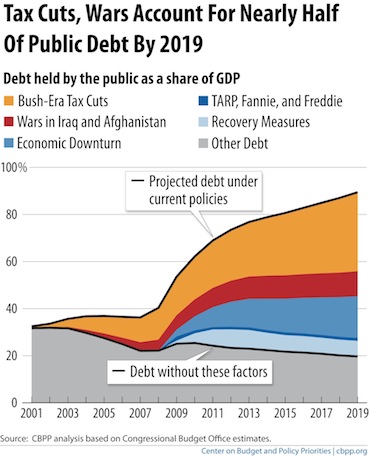Ezra Klein, anticipating a lot of Republicans disingenuously blaming Obama for the national debt, points to a Center on Budget and Policy Priorities chart showing that the increase in the debt comes almost entirely from Bush-era policies:
Kevin Drum says, “Their success at convincing half the country that Barack Obama is responsible for our soaring debt is surely one of the greatest political propaganda victories of all time.”
It’s also a press failure.
— Matt Stoller reviews former SIGTARP Neil Barofsky’s new book Bailout (emphasis mine):
Perhaps the most important revelation in the book is a meeting with Geithner that Barofsky recounts, where Geithner says that Treasury’s housing initiatives were successful, despite their inability to stem the tide of foreclosures. The programs were meant, Geithner says, to “foam the runway” for banks, spread out foreclosures since banks couldn’t take a hit all at once. The publicly stated rationale for administration housing initiatives, in other words, was simply a lie. The Obama administration didn’t try to prevent a foreclosure crisis, they just spaced it out to help the large banks. This is very important information, and it’s useful that it has come out now.
Institutionally, Barofsky identifies his major points of leverage as the press and Congress (as well as working with DOJ to send some bankers who stole TARP money to jail). His reports generated outrage, and Congressional action. As a result, Treasury had to routinely modify their programs in response to this scrutiny. Congress just loved what Barofsky was doing, because he was validating the suspicions that Treasury was handing taxpayer money over to the banks, and being specific about how that was happening.
— ProPublica last week put out a good investigation into how social welfare nonprofits are pouring tens of millions of dollars into political activities. They don’t have to disclose their donors and in many cases the 501(c)4 spending runs afoul of IRS rules:
Ryan Chittum is a former Wall Street Journal reporter, and deputy editor of The Audit, CJR’s business section. If you see notable business journalism, give him a heads-up at rc2538@columbia.edu. Follow him on Twitter at @ryanchittum.We found that some groups said they would not engage in politics when they applied for IRS recognition of their tax-exempt status. But later filings showed they spent millions on just such activities…
We also found that social welfare groups used a range of tactics to underreport their political activities to the IRS, a critical measure in determining whether they are entitled to remain tax-exempt.
Many groups told the IRS they spent far less on politics than they reported to federal election officials. Some classified expenditures that clearly praised or criticized candidates for office as “lobbying,” “education” or “issue advocacy” on their tax returns.


